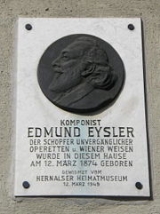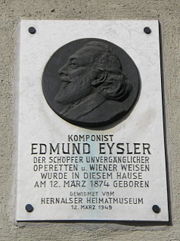
Edmund Eysler
Encyclopedia

Austria
Austria , officially the Republic of Austria , is a landlocked country of roughly 8.4 million people in Central Europe. It is bordered by the Czech Republic and Germany to the north, Slovakia and Hungary to the east, Slovenia and Italy to the south, and Switzerland and Liechtenstein to the...
n composer
Composer
A composer is a person who creates music, either by musical notation or oral tradition, for interpretation and performance, or through direct manipulation of sonic material through electronic media...
.
Biography
Edmund Eysler was born in Vienna to a merchant family. He was supposed to enter the engineering profession, but his acquaintance with Leo FallLeo Fall
Leo Fall was an Austrian composer of operettas.-Life:Born in Olmütz , Leo Fall was taught by his father Moritz Fall , a bandmaster and composer, who settled in Berlin. The younger Fall studied at the Vienna Conservatory before rejoining his father in Berlin...
led him to study music
Music
Music is an art form whose medium is sound and silence. Its common elements are pitch , rhythm , dynamics, and the sonic qualities of timbre and texture...
at the Vienna Conservatory, where he studied composition
Musical composition
Musical composition can refer to an original piece of music, the structure of a musical piece, or the process of creating a new piece of music. People who practice composition are called composers.- Musical compositions :...
under Robert Fuchs
Robert Fuchs
Robert Fuchs was an Austrian composer and music teacher.As Professor of music theory at the Vienna Conservatory, Fuchs taught many notable composers, while he was himself a highly regarded composer in his lifetime....
, and became educated as a piano teacher and Kapellmeister
Kapellmeister
Kapellmeister is a German word designating a person in charge of music-making. The word is a compound, consisting of the roots Kapelle and Meister . The words Kapelle and Meister derive from the Latin: capella and magister...
. After completing his degree with many plaudits, Eysler made ends meet by teaching piano.
In 1898, he married Poldi Allnoch, with whom he would have two daughters, and in 1901, he found a position as a Kapellmeister. After that, he composed chamber music and piano pieces, as well as the opera Fest auf Solhaug (Celebration on Solhaug), and the ballet Schlaraffenland.
Through a magnanimous relative, Eysler met the librettist Ignaz Schnitzer, who was compiling the text for Zigeunerbaron (Gypsy King). Eysler was given the task of setting this text to the opera Der Hexenspiegel (The Witches' Mirror) by Schnitzer. Originally, the work was supposed to be staged at the Vienna Court Opera
Vienna State Opera
The Vienna State Opera is an opera house – and opera company – with a history dating back to the mid-19th century. It is located in the centre of Vienna, Austria. It was originally called the Vienna Court Opera . In 1920, with the replacement of the Habsburg Monarchy by the First Austrian...
upon completion, but it was spurned by the director for having overly simple music. Josef Weinberger encouraged Eysler to turn the music for Hexenspiegel into an operetta. It became the operetta Bruder Straubinger, which was a big success on its premiere on 20 February 1903, with Alexander Girardi
Alexander Girardi
Alexander Girardi was an Austrian] actor and tenor singer in operettas.- Career :Girardi was born in Graz; his father was the locksmith Andreas Girardi who had migrated to Graz from Cortina d'Ampezzo. Following the early death of his father, Alexander Girardi was raised by his stepfather who put...
in the main role.
Eysler composed the operetta Der unsterbliche Lump (The Immortal Blight), with a libretto by Felix Dörmann, for the Vienna Bürgertheater
Bürgertheater
The Bürgertheater was a theatre in Vienna.The Wiener Bürgertheater was erected in 1905 in the Third District , at Vordere Zollamtsstraße 13. It was designed by the architects Franz von Krauss and Josef Tölk. The official opening took place on December 7, 1905, with the performance of Der alte Herr...
. On 14 October 1910, this work was performed for the first time, with overwhelming success. Critics claimed Eysler's operetta signalled a change in the genre. The composer's music was praised, especially the solid instrumentation and the simple harmonies. The success ensured that Eysler would remain the Bürgertheater's "house composer". On 23 December 1911, his newest operetta, Der Frauenfresser (The Woman-Eater) was also well received. This was followed by the premiere of Der lachende Ehemann (The laughing groom) in March 1913. What was especially well-received by reviewers were the catchy, unpretentious melodies. This work had been performed 1793 times by 1921. Even during the years of World War I
World War I
World War I , which was predominantly called the World War or the Great War from its occurrence until 1939, and the First World War or World War I thereafter, was a major war centred in Europe that began on 28 July 1914 and lasted until 11 November 1918...
, more and more of Eysler's operettas were staged at the Vienna Bürgertheater every season, such as Frühling am Rhein (Rhine Spring), Die – oder Keine! (That One – Or No One) und Der dunkle Schatz (The Dark Treasure). After the end of World War I
World War I
World War I , which was predominantly called the World War or the Great War from its occurrence until 1939, and the First World War or World War I thereafter, was a major war centred in Europe that began on 28 July 1914 and lasted until 11 November 1918...
, Eysler published one further, very successful operetta, Die gold’ne Meisterin (The Golden Mistress), which was very successful in Vienna.
Due to Eysler's Jewish background, his works were banned from being performed by the Nazis
Nazism
Nazism, the common short form name of National Socialism was the ideology and practice of the Nazi Party and of Nazi Germany...
, leading Adolf Hitler
Adolf Hitler
Adolf Hitler was an Austrian-born German politician and the leader of the National Socialist German Workers Party , commonly referred to as the Nazi Party). He was Chancellor of Germany from 1933 to 1945, and head of state from 1934 to 1945...
to discover that his favourite operetta, Die gold'ne Meisterin, was by a Jew. Instead of fleeing immediately, he found shelter with relatives and friends. The title of Honoured Citizen of Vienna gave him a certain protection. After the war, he achieved his last great success with the operetta Wiener Musik (Viennese Music), which premiered on 22 December 1947 at the Bürgertheater. For his 75th birthday, he was given the Ring of Honour by the city, and the memorial plaque on his birthplace in Thelemanngasse, which had been removed during the time of the Nazis, was reinstated.
Eysler died on 4 October 1949, in Vienna as a consequence of a fall from the stage, and was buried in a grave of honour at the central graveyard in Vienna. With a total of 60 operettas, Eysler's influence in shaping the Austrian music environment of the time was felt very strongly. International success was less forthcoming because Eysler's music was Vienna-centric and based on local folklore.
Awards
- Bürger ehrenhalber der Stadt Wien (conferred on 7 October 1927) (Honoured Citizen of the City of Vienna)
- Träger des Goldenen Ehrenzeichens der Republik Österreich (conferred on 27 March 1934) (Bearer of the Golden Symbol of Honour of the Republic of Austria)
- Ehrenring der Stadt Wien (conferred in 1949) (Ring of Honour of the City of Vienna)
- Eyslergasse, Wien-Hietzing (1955)
Operas
- Der Hexenspiegel (1900) (The Witches' Mirror)
- Fest auf Solhaug (Celebration on Solhaug)
Operettas
- Das Gastmahl des Lucullus (1901) (Lucullus' Banquet)
- Bruder Straubinger (1903) (Brother Straubinger)
- Die Schützenliesel (1905)
- Künstlerblut (1906) (Artists' Blood)
- Vera Violetta (1907)
- Das Glücksschweinchen (1908) (The Lucky Pig)
- Johann der Zweite (1908) adapted on Broadway as The June Bride
- Der unsterbliche Lump (1910) (The Undying Blight)
- Das Zirkuskind (1911) (The Circus Child)
- Der Frauenfresser (1911) (The Woman-Eater)
- Ein Tag im Paradies (1913) (One Day in Paradise; adapted on Broadway as The Blue ParadiseThe Blue ParadiseThe Blue Paradise is a musical with music by Edmund Eysler and Sigmund Romberg, lyrics by Herbert Reynolds, and a book by Edgar Smith, based on the operetta Ein Tag im Paradies by Eysler with original text by Leo Stein and Bela Jenbach. The story is set in a Viennese cafe, where a man realizes...
) - Der lachende Ehemann (1913) (The Laughing Groom)
- Hanni geht tanzen! (1916) (Hanni Goes Dancing!)
- Die fromme Helene (1921) (Pious Helene)
- Die gold'ne Meisterin (1927) (The Golden Mistress)
- Donauliebchen (1932) (Danube Sweetheart)
- Wiener Musik (1947) (Viennese Music)

